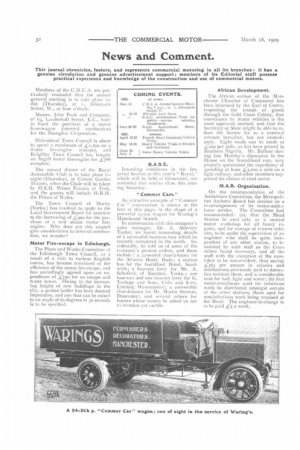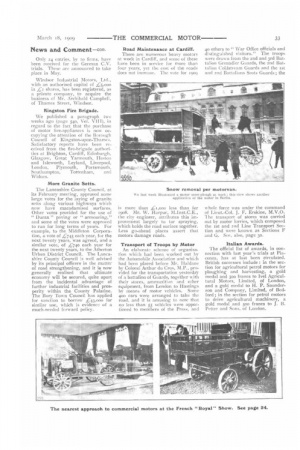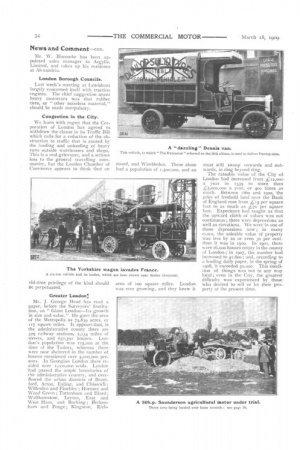News and Comment.
Page 10

Page 11

Page 12

If you've noticed an error in this article please click here to report it so we can fix it.
This journal chronicles, fosters, and represents commercial motoring in all its branches : it has a genuine circulation and genuine advertisement support ; members of its Editorial stall possess practical experience and knowledge of the construction and use of commercial motors.
Members of the C.M.U.A. are par.ticularly reminded that the annual general meeting is to take place today (Thursday), at 1, Albemarle Street, W., at four o'clock.
Messrs. John Pook and Company, o! 63, Leadenhall Street, E.C., have in hand the purchase of a motor .hose-wagon (internal combustion) for the Shanghai Corporation.
Birkenhead Town Council is about to spend a maximum of £1,200 on a rr.otor fire-engine (escape), and Keighley Town Council has bought an Argyll motor fire-engine for ;788 .complete.
The annual dinner of the Royal Automobile Club is to take place tonight (Thursday), at Covent Garden Theatre, when the Chair will be taken by U.S.N. Prince Francis of Teck, and the guests will include H.R.II. the Prince of Wales.
The Town Council of Morley (Yorks.) has resolved to apply to the Local Government Board for sanction to the borrowing of L',930 for the purchase of a new steam motor fireengine. Why does not this council give consideration to internal combustion, we wonder?
Motor Fire-escape in Edinburgh.
The Plans and Works Committee of the Edinburgh Town Council, as a result of a visit to various English towns, has become convinced of the efficiency of the Motor fire-escape, and has accordingly agreed upon an expenditure of ,Z;75o for an escape and water tower. Owing to the increasing height of new buildings in the city, a 9o-foot ladder has been deemed imperative, and one that can be raised to an angle of 6o degrees in 30 seconds is to be specified. R.A.S. E.
Intending exhibitors in the Im perial Section at this year's " Royal,' which will be held at Gloucester, are reminded dint entries clase this coining Saturday.
"Commcr Cars."
An attractive example of " Commer Car " construction is shown at the foot of this page, in the shape of a powerful 2-ton wagon for Waring's Manchester branch.
In conversation with this company's sales manager, Mr. A. Alderney Taylor, we learnt interesting details of a successful business tour which he recently completed in the north. Incidentally, he told us of some of the company's present orders, and these include : a 22-seated char-A-bancs for the Atlantic Hotel, Bude; a station bus for the Guildford Hotel, Sandwich; a four-ton lorry for Mr. A. Schofield, of Marsden, Yorks.; one four-ton and one two-ton lorry for G. Trollope and Sons, Coils and Sans, Limited, 1Vestrninster; a convertible char-à-bancs for Mr. Marlin Stenton, Doncaster; and several others for buyers whose names he asked us not to mention yet awhile. African Development.
The African section of the Manchester Chamber of Commerce has been informed by the Earl of Crewe, respecting the transit of goods through the Gold Coast Colony, that conveyance by motor vehicles is the most approved method, and that the Secretary of State might be able to reduce the license fee to a nominal amount hereafter, but not immediately. Light roads can be made at £200 per mile, as has been proved in Southern Nigeria. Mr. Balfour during last Monday's discussion in the House on the Somaliland vote, very properly questioned the expediency of spending at least ,i,3,000 a mile on a light railway, and other members supported the claims of road motor.
M.A.B. Organisation.
On the recommendation of the Ambulance Committee, the Metropolitan Asylums Board has decided on a re-arrangement of its motor-ambulance service. The Committee had recommended : (a), that the Mead Station be used only as a central motor workshop for all heavy repairs, and for storage of reserve vehicles, to be under the supervision of an engineer who shall be quite independent of any other station, to b2 assisted by such staff as the Committee found necessary, and all the staff with the exception of the caretaker to be non-resident, thus saving -/-363 per annum in salaries and emoluments previously paid to domestics resident there, and a considerable sum for fuel, light and water ; (b) that motor-omnibuses used for infectious work be distributed amongst certain of the other stations, those used for non-infectious work being retained at the Mead. The engineer-in-charge is
to be paid a week. Only 24 entries, by ro firms, have been received for the German C.V. trials. These are announced to take place in May.
Windsor Industrial Motors, Ltd., with an authorised capital of ,..5,000 in 471 shares, has been registered, as a private company, to acquire the business of Mr. Archibald Campbell, of Thames Street, Windsor.
Kingston Fire Brigade.
We published a paragraph two weeks ago (page 540, Vol. VIII), in regard to the fact that the purchase of motor fire-appliances is now occupying the attention of the Borough Council of Kingston-upon-Thames. Satisfactory reports have been received from the fire-brigade authorities at Brighton, Cardiff, Edinburgh, Glasgow, Great Yarmouth, Heston and Isleworth, Leyland, Liverpool, London, Plymouth, Portsmouth, Southampton, Tottenham, and Widnes.
More Granite Setts.
The Lancashire County Council, at itsFebruary meeting, approved some large votes for the laying of granite setts along various highways which now have macadamised surfaces. Other votes provided for the use of " Durax " paving or " armouring," and some of the votes were approved to run for long terms of years. For example, to the Middleton Corporation, a vote of £745 each year, for the next twenty years, was agreed, and a similar vote, of £740 each year for the next twenty years, to the Atherton Urban District Council. The Lancashire County Council is well advised by its principal officers in the matter of road strengthening, and it is now generally realised that ultimate economy will be secured, quite apart from the incidental advantage of further industrial facilities and prosperity within the County Palatine. The Bury Town Council has applied for sanction to borrow ."43,000 for similar use, which is evidence of a much-needed forward policy.
Road Maintenance at Cardiff.
There are numerous heavy motors at work in Cardiff, and some of these have been in service for more than four years, yet the cost of the roads does not increase. The vote for two is more than L'i,000 less than for 1908. Mr. W. Harpur, M.Inst.C.E., the city engineer, attributes this improvement largely to tar spraying, which holds the road surface together. Less go-ahead places assert that motors damage roads.
Transport of Troops by Motor
An elaborate scheme of organisa. Lion which had been worked out by the Automobile Association and which had been placed before Mr. II:Aid:me by Colonel Arthur du C.ros, M.P., provided for the transportation yesterday of a battalion of Guards, together with their stores, ammunition and other equipment, from London to Hastings by means of motor vehicles. Some 400 cars were arranged to take the road, and it is amusing to note that no less than 55 vehicles were apportioned to members of the Press, and cp.) others to " War Office officials and distinguished visitors." The troops were drawn from the znd and 3rd Battalion Grenadier Guards, the 2nd Battalion Coldstream Guards and the ist and znd Battalions Scots Guards; the whole force was under the command of Lieut.-Col. J. F. Erskine, M.V.O. '1 he transport of stores was carried out by motor lorries, which composed the 1st and 2nd Line Transport Section and were known as Sections F and P. See, also, page 30.
Italian Awards.
The official list of awards, in connection with last year's trials at Piacenza, has at last been circulated. British successes include : in the section for agricultural petrol motors for ploughing and harvesting, a gold medal and coo francs to Ivel Agricultural Motors, Limited, of London, and a gold medal to H. P. Saunderson and Company, Limited, of Bedford ; in the section for petrol motors to drive agricultural machinery, a gold medal and soo francs to J. B. l'etter and Sons. of London.
Mr. NV. Biscombe has been appointed sales manager to Argylls, Limited, and takes up his residence at Alexandria.
London Borough Councils.
Last week's meeting at Lewisham largely concerned itself with traction engines. The chief suggestion anent heavy motorcars was that rubber tires, or "other noiseless material," should be made compulsory.
Congestion in the City.
We learn with regret that the Corporation of London has agreed to withdraw the clause in its Traffic Bill which calls for a reduction of the obstruction to traffic that is caused by the loading and unloading of heavy vans outside warehouses and shops. This is a real grievance, and a serious loss to the general travelling community, but the London Chamber of Commerce appears to think that an old-time privilege of the kind should Oe perpetuated.
Greater Londonl Mr. J. George Head has read a paper, before the Surveyors' Institution, on " Giant London—Its growth in size and value." He gave the area of the Metropolis as 74,839 acres, or 117 square miles. It appears that, in the administrative county there are 329 railway stations, 2,134 miles of streets, and 632,591 houses. London's population was 125,000 at the time of the Tudors, whereas there were now sheltered in the number of houses mentioned over 5,000,000 persons. In Georgian London there resided over i,000,000 souls. London had passed the ample boundaries of the administrative country, and overflowed the urban districts of Brentford, Acton, Ealing, and Chiswick: Willesden and Finchlev ; Hornsey and Wood Green ; Tottenham and Ilford: Walthamstow, Leyton, East and West Hain, and Barking ; Beckenham and Penge; Kingston, Rich
mond, and Wimbledon. These alone had a population of 1,5oo,000, and an area of loo square miles. London was ever growing, and they knew it must still sweep onwards and out-wards, in ring beyond ring.
The rateable value of the City of. London had increased from .4;12,000. a year in 1339 to more than. ,:5,000,cloo a year, or 400 times as much. Between 1860 and 19oo, the price of freehold land near the Bank of England rose from 4;15 per square foot to as much as -.X70 per square foot. Experience had taught us that the upward climb of values was not continuous ; there were depressions as well as elevations. We were in one of those depressions now ; in many ckses, the saleable value of property was less by 20 or even 30 per cent. than it was in i9oo. In 1901, there w ere i6,000 houses empty in the county of London ; in 1907, the number had. increased to 41,600; and, according to a leading daily paper, in the spring of 1908, it exceeded 50,000. This condition of things was not in any way local ; even in the City, the greatest difficulty was experienced by those• who desired to sell or let their property at the present time.
























